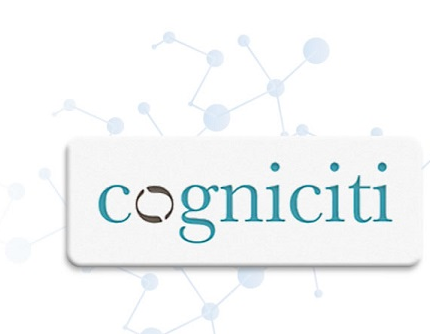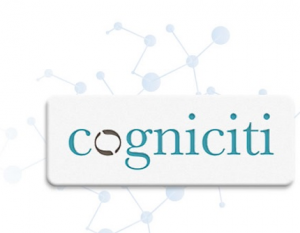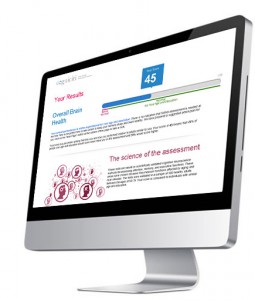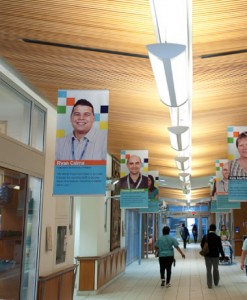Free Online Memory Test Evaluates Brain Health Status in Persons Over 50
Written by |

Increasing incidence of Alzheimer’s Disease and other forms of senile dementia as the population demographic ages has raised general anxiety levels. It’s not entirely paranoia. Risk of developing Alzheimer’s doubles every five years after age 65.
 Toronto, Canada-based Cogniciti, Inc. cites a recent Brain Health Study (about which more below) showing that 70 percent of Americans aged 45-79 describe their memory as much worse or somewhat worse versus five years ago, and 91 percent of that group believe middle-aged and older adults should have their brain health checked regularly.
Toronto, Canada-based Cogniciti, Inc. cites a recent Brain Health Study (about which more below) showing that 70 percent of Americans aged 45-79 describe their memory as much worse or somewhat worse versus five years ago, and 91 percent of that group believe middle-aged and older adults should have their brain health checked regularly.
“We know that many adults worry about the forgetfulness that comes with aging, and fear it might be something more serious,” says Cogniciti’s President Michael Meagher. “In fact, the Brain Health Study showed that dementia/Alzheimer’s ranks as the second most feared disease in America behind cancer.” Eight of ten Americans surveyed stated that it was very important for them to have access to a brain health assessment that was private, free and supported by clinical research to answer the question ‘Is my memory normal or should I see my doctor?’ Cogniciti’s Brain Health Assessment is exactly that tool, available online for free.
An estimated 135 million people around the world will have dementia by 2050 according to a report by Alzheimer’s Disease International (ADI), and the number of victims is expected to almost double every 20 years as populations undergo rapid and nearly universal aging. Indeed, The Financial Times is reporting today (paywall) that every country save for a few African nations will see working-age populations either shrink or age by 2030, according to the ratings agency, while the growth rate of the global workforce will fall by 50%, and the world will have 13 “super-aged nations by 2020.
[adrotate group=”3″]
The estimated economic cost of dementia is $604 billion annually (2010), according to the ADI report, and these costs are expected to escalate at least proportionally with numbers affected, particularly in low and middle income countries.
 For those pondering whether they need to see a doctor about memory concerns, Cogniciti has just launched of a free, online Brain Health Assessment at https://cogniciti.com.
For those pondering whether they need to see a doctor about memory concerns, Cogniciti has just launched of a free, online Brain Health Assessment at https://cogniciti.com.
The company says that while it’s not a diagnostic tool, the online assessment is like a “temperature check for the mind” that will help a person determine the right time to discuss memory concerns with their doctor. The aim is to reassure the vast majority of adults who are healthy (the “worried well”) and nudge the small percentage of people who scored below normal to get checked by their doctor.
 “Getting checked early is the best way to rule out other health problems such as stress and depression, that could be causing cognitive issues,” says Dr. Angela Troyer, program director of Neuropsychology and Cognitive Health at Baycrest Health Sciences, which is fully affiliated with the University of Toronto, in a Cogniciti release. Dr. Troyer was a lead member of the research team that developed the test. “If it turns out you do have a significant problem with your memory, then early diagnosis will help you maintain your cognitive health and independence for as long as possible, and enable you and your family to plan for the care and support you’ll need in the future.”
“Getting checked early is the best way to rule out other health problems such as stress and depression, that could be causing cognitive issues,” says Dr. Angela Troyer, program director of Neuropsychology and Cognitive Health at Baycrest Health Sciences, which is fully affiliated with the University of Toronto, in a Cogniciti release. Dr. Troyer was a lead member of the research team that developed the test. “If it turns out you do have a significant problem with your memory, then early diagnosis will help you maintain your cognitive health and independence for as long as possible, and enable you and your family to plan for the care and support you’ll need in the future.”
The Cogniciti Brain Health Assessment is specifically aimed at adults 50-79. It takes 20 minutes to complete, using game-like activities, which scientists know are sensitive to changes in brain health due to aging, including matching games, and face and name recognition.
Earlier this year, Bionews Texas‘ Anna Tan reported that a team of scientists from the University of California at San Francisco (UCSF)’s neuroscience laboratory are working on determining just how effective playing video games is in stimulating impaired or under-stimulated areas of the brain, in hope of finding a game-based methodology for improving brain function, and speculating that video games could even have a curative effect on an individual’s brain.
Ms. Tan noted that earlier research on video games’ potential to enhance brain function and learning was published in The Scientific American Mind, reporting finding that first-person shooter video games improved hand-eye coordination, spatial reasoning, spatial focus, visual acuity and decision-making. She also cited another study conducted by a team from the University of Texas Medical Branch that found particular video games improved surgeons’ performance.
Persons who complete the Cogniciti test will receive an immediate Yes/No report about whether to take their memory concerns to their doctor. The two-to-three percent who score below normal will be encouraged to retest a week later and will be provided a report to take to their doctor. If a score is within the normal range, the test taker will be provided with a science-based action plan to keep their minds sharp and brains healthy. Participants can take the online test in the privacy of their home and scores are stored in a password-protected form, allowing test-takers to track their performance over time.
While memory and attention loss are natural parts of aging, the symptoms for anxiety, depression and even the more serious diseases such as Alzheimer’s, are so similar people tend to delay getting checked out — often for years. Those delays can cause needless worry for the well and make treatment tougher for those who do have a neurodegenerative disease. Cogniciti’s Brain Health Assessment can help eliminate those delays and get the right people to the doctor earlier.
Cogniciti says the Brain Health Assessment was designed by a team of clinical neuropsychologists and cognitive scientists at Baycrest and its Rotman Research Institute in Toronto, an international centre for study of human brain function ranked among the best in the world for cognitive neuroscience focused on memory and aging. The Institute’s primary research focus is on memory and the executive (frontal lobe) functions of the brain, both in normal aging and in the presence of diseases and conditions which affect the brain, such as stroke, traumatic brain injury, Alzheimer’s disease and other dementias. More than 1,000 adults volunteered to participate in the assessment protocol’s development, with the final normative data collected from a panel of more than 300 men and women aged 50 to 79.
The Brain Health Assessment and access additional tools and science-based information such as a Memory Centre and a Caregiver Centre Visit can be found at https://www.cogniciti.com
The Brain Health Study was conducted on behalf of Cogniciti by Northstar, a global market research and consulting firm with offices in New York, London and Toronto. A total of 1,001 Americans aged 45 to 79 participated in the online study between July 17 and July 22, 2014. Sampling quotas and weighting were used to ensure the sample was representative of the U.S. population in terms of age, gender and region. Assuming a probability sample, the margin of error would be +/- 3.1 percentage points, 19 times out of 20.
Sources:
Cogniciti Inc.
Baycrest Health Sciences
Rotman Research Institute
Alzheimers Disease International
The Financial Times
Bionews Texas
Image Credits:
Cogniciti Inc.





